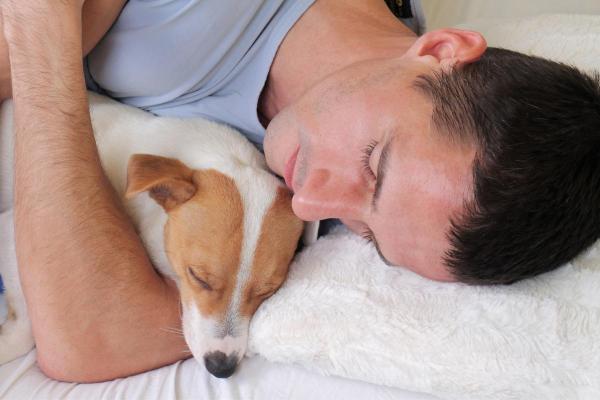Why Does My Dog Lay on My Stomach?



See files for Dogs
Dogs are often at complete rest when laying on top of us. Despite not making any noise other than some nose breathing, they are actually communicating something very important. When willing to sleep on our lap or share similar proximity, dogs are revealing something about the relationship you have together. Most often, this is a positive behavior representing the close bond you share. However, if it is accompanied by signs of anxiety or stress, it could be revealing something more negative about their environment or care. This is because affection and companionship is beneficial, but neediness and attachment issues are not.
At AnimalWised, we discover when this behavior is or is not positive by asking why does my dog lay on my stomach? We look at why this can be a simple expression of their closeness to us and when it can be a sign of a problem which needs our attention.
Protection
When dogs were first domesticated, their use as protectors was paramount. In the often vulnerable communities of ancient civilizations, dogs were able to better ensure safety against attack. While many dogs are still used in similar roles, many more fulfil the role of companion. This does not mean the protective instinct has left, but some feel it more strongly than others.
In their natural state, dogs are gregarious animals that form social groups. While a dog does not see humans as one of their own, they do incorporate us into their social group when we adopt them into our family. Sleeping together affords dogs greater protection since they can recognize potential threats quickly and inform the others. Doing so also provides physical protection against the elements.
For this reason, it is natural for a dog which sees you as part of their pack to lay on top of you. Dogs sleeping on top of their guardians is an expression of their protective instinct. It is a good sign that you've built a bond of affection and trust with your canine companion. A dog would not want sleep next to someone who makes them afraid or elicits any other negative emotion.
They are cold
As we mentioned, another reason why my dog sleeps on my belly is to protect against the elements. This is particularly the case when the ambient temperature is very cold. By coming close and laying on top of you, your dog can better regulate their body temperature. When adverse weather conditions appear, it is not uncommon for your dog to want to share your body heat and to provide you with theirs as a form of protection.
While this again indicates that your dog trusts you enough to sleep on you, it's important to ensure they have somewhere comfortable to rest at all times. Especially during winter, check if their normal sleeping areas has drafts or a lack of comforters which can add to the cold.
Find out why a dog may be shaking even though it is not cold with our related guide.

Acquired behavior
Dogs are creatures of habit that crave a routine. Doing so helps them to feel more secure and protect themselves against the unknown. When a dog adopts certain behaviors in their youth, they can become ingrained. These are known as acquired behaviors and they apply to almost any behavior your dog can exhibit.
When the dog is a puppy, you may want to play with them and even hold them across your stomach when doing so. Puppies will also sleep a lot during the day and letting them do so on our belly can be an adorable experience. If we let our dog carry out these behaviors, they become acquired. This means they will still do it later in life because they see them as normal and acceptable.
Rightly so, many acquired behaviors have negative connotations. For example, if we let a dog nip or bite our hands while they are a puppy, then we should not be surprised if they keep doing so as an adult. Letting a dog sleep on our stomach is not necessarily problematic if it causes us no problems. However, some dogs may be too large or disruptive, meaning laying on our stomach can become a problem.
If you do not want a dog to lay on top of your when they have matured, you should not let them do it as a puppy. This means you will prevent doing so becoming an acquired behavior. If we decide we no longer want to permit certain behaviors, we will need to redirect them with behavior modification techniques.
Fear or anxiety
Dogs have such highly developed sensory capabilities that allow them to detect even minute changes in their environment. These are stimuli which otherwise are completely unnoticed by their human guardians. This is why proper socialization is so important when they are young. They need to discern between normal stimuli in their environment which pose no threat and those which require a reasonable response.
For example, a dog might hear the footsteps of a mail carrier outside the home. This is a stimuli which does not pose a threat, but it is common for dogs to bark as if they were. In their mind, they are alerting their beloved family of a potential danger. We need to teach them to respond appropriately to such stimuli so they do not carry out unwanted behaviors.
If your dog senses certain stimuli and comes to you out of fear, it could be due to poor socialization. The dog may lay on top of your stomach because they either want to protect you or are afraid for themselves. If there is genuine danger, this is a helpful behavior. If it is an unreasonable response to otherwise normal stimuli, it is a behavioral problem which needs to be identified.
We can identify the symptoms of fear and anxiety in a dog with the following symptoms:
- Tail down or between the legs
- Ears back or flat against the head
- Hunched or crouched body posture
- Calming signals (e.g. licking lips, looking away or yawning)
- Muscle stiffness or trembling
Calming signals in dogs are the methods of communications canines use to reduce perceived threats. If they are afraid, they can yawn, look to the side, lick their lips or carry out other behaviors to try to mollify the situation. In more extreme cases of fear or anxiety, a dog may lose control of their urinary tract, involuntarily urinating in inappropriate places such as the sofa or their owner's bed.
Fear is a natural emotion that is part of the survival mechanisms of dogs, something we humans also share. Despite this, excessively fearful or insecure behavior should not be normalized. It can indicate health problems, as well as failures in the dog’s education or care. If you notice your dog is very afraid or their character changes suddenly, do not hesitate to consult a veterinarian.
Learn about other compulsive behaviors in dogs which may be a result of stress or anxiety.

Hyperattachment
Another reason why our dog sleeps on our belly is hyper-attachment. This is a state of inordinate attachment to a guardian which puts their emotional well-being at risk. A common case is that of dogs suffering from separation anxiety. Such dogs are unable to manage being alone in a healthy way. Dogs which experience separation anxiety can react negatively, often becoming hyper-attached when their guardians are present.
Other common symptoms of separation anxiety in dogs include:
- Destructive behaviors
- Crying
- Incessant barking
- Urinating or defecating inappropriately
There are other less extreme cases of hyper-attachment that manifest when the dog wants to be with their guardian all the time. In these cases, they tend to do anything to get their attention. They often prevent any other individual from approaching their guardian, even resorting to aggression. This can be seen if the dog lays on our stomach and barks if anyone else comes close.
This type of possessive behavior can be associated with multiple factors, but it is much more common in dogs that have not been properly socialized. This is just one of the reasons why it is essential to start socializing dogs from an early age.
To make it easier for us to establish the human-dog bond, we share a video on dog socialization below. Doing so will help us avoid negative situations which can harm the dog's emotional and physical health.

Changes in our body
Dogs are able to sense many things about their environment and those within it. In particular, dogs have an amazing olfactory ability, allowing them to identify hormonal changes in our body. This can occur before we have even noticed any symptoms of such changes. When something is different in our body, our dog can be alerted and want to notify us. To do so, they may lay on top of our stomach as a way to communicate this.
For example, dogs may rest their head on their owner's belly when they are pregnant. There are even women who claim that they began to suspect that they were pregnant due to the behavioral changes of their canine companion.
There is also a widespread belief that dogs can detect illnesses in people or even predict ensuing death. Although there is much controversy regarding this predictive ability, we know that various metabolic disorders and pathologies actually produce changes at a physical and hormonal level. These do not go unnoticed by the powerful canine senses, although this does not mean they know your health is at risk.
If you do have such an illness, your dog may start to show more affection and want to stay with you for longer. This can happen if we are experiencing physical discomfort, but dogs are also able to perceive changes in your emotional well-being. This can be the case even if we are yet to notice them. In this way, our dog can tell that we are stressed or depressed before we can by reading our body language and interpreting our behaviors.
When our dog starts to lay on or stomach more than usual, it is a good opportunity to assess both their well-being and our own. Look for symptoms of physical and emotional problems. Address them accordingly by going to your veterinarian or seeking the advice of a canine ethologist, just as we would seek the advice of a doctor or mental health professional.
If you want to read similar articles to Why Does My Dog Lay on My Stomach?, we recommend you visit our Basic care category.







